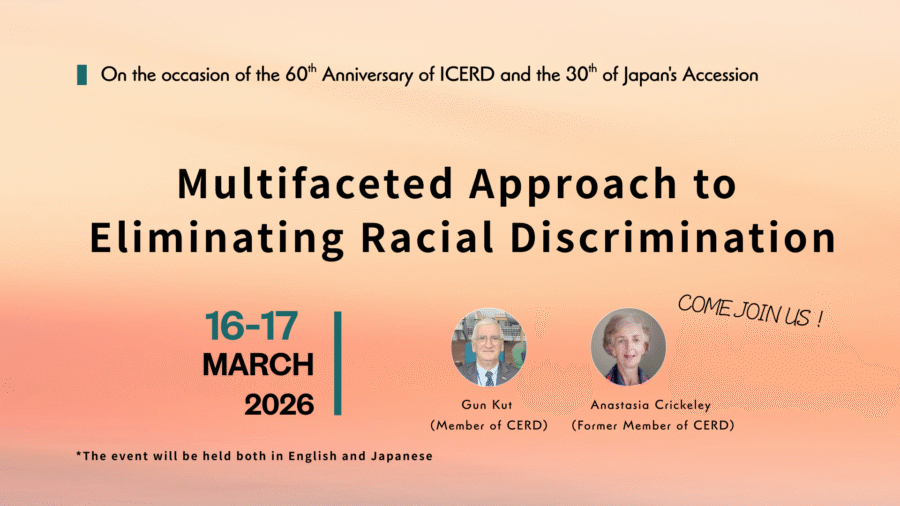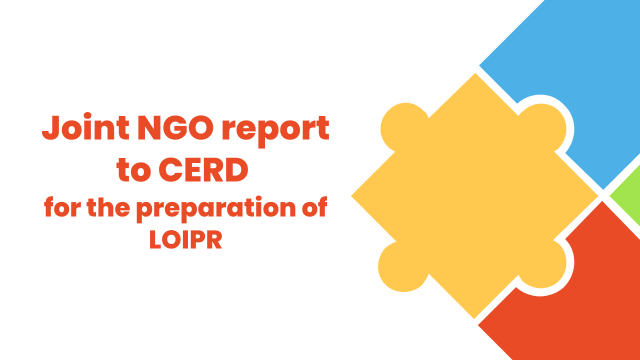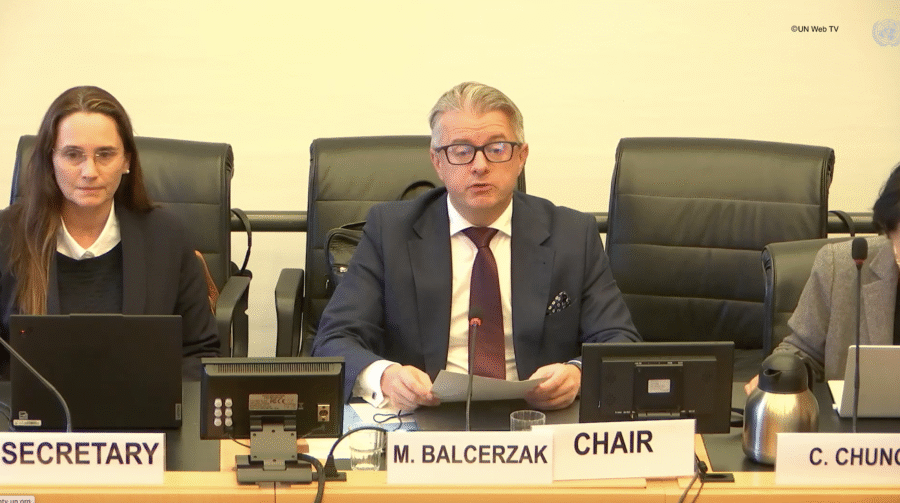Human rights defenders shared experience in Burma and Sri Lanka at the UN Human Rights Council (19 March 2015)
March 31, 2015
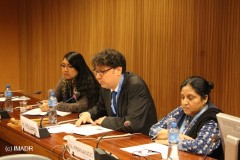 On 19th March 2015, International Movement Against All Forms of Discrimination and Racism (IMADR) and Forum-Asia
On 19th March 2015, International Movement Against All Forms of Discrimination and Racism (IMADR) and Forum-Asia ![]() hosted a parallel event titled “Political Transition, Democracy and Human Rights: The Experience in Burma and Sri Lanka” at the 28th session of the UN Human Rights Council. The speakers for the event are Dr. Nimalka Fernando from IMADR and Ms. Khin Ohmar from Burma Partnership
hosted a parallel event titled “Political Transition, Democracy and Human Rights: The Experience in Burma and Sri Lanka” at the 28th session of the UN Human Rights Council. The speakers for the event are Dr. Nimalka Fernando from IMADR and Ms. Khin Ohmar from Burma Partnership ![]() . The moderator for the panel discussion was Dr. Matt Pollard from International Commission of Jurists (ICJ)
. The moderator for the panel discussion was Dr. Matt Pollard from International Commission of Jurists (ICJ) ![]() which works on independence of judges and lawyers, and access to justice.
which works on independence of judges and lawyers, and access to justice.
Attacks against minorities
Dr. Pollard opened the discussion by questioning the current situation of ethnic and religious minorities in the two countries.
Dr. Fernando highlighted the increasing violence against religious minorities and collapse of rule of law. She described Sri Lanka as “two nations in one country”, which is divided by two communities: Tamils and Shinhalese. The conflict arose due to the non-resolution of the political challenge faced in forming the Sri Lankan state where the rights of minorities was not recognised. Sri Lanka also is a pluralist society with a multi-religious ethos. In the post war scenarios Buddhist – Muslims tensions arose as the Mahinda Rajapakse regime nurtured Buddhist extremist forces namely the Bodu Bala Sena (BBS). The Muslim community also experienced being explelled from the North by the LTTE in the 1990s. The issue of identity politics is still a challenge in Sri Lanka. There are still unresolved national question. She emphasised the need for security, power-sharing, the state of dignity and human rights to solve minority issues. She also shared concern of the recent extremists’ attempts to misuse Buddhism to attack Muslim communities, which must be seen as systematic violence and not categorise them as sporadic incidents like some member States did in the past.
Ms. Ohmar expressed a similar view by introducing Burma as “many nations for one country”. She emphasised the difference of Burma from Sri Lanka, since there are more than one ethnic army and some of them demand self-determination including the Kachin state. Yet, Burma army is the main perpetrator of human rights violations against ethnic minorities. She noted some positive aspects such as the election in 2010 and talks about equality of minorities which was addressed for the first time. However, she spoke on threats to civil society actors who engage with ethnic minorities, increasing violence in the Kachin state, the rise of extreme Buddhism and nationalism as well as attacks against Muslims. These factors have contributed to segregation among communities.
Sexual violence
Dr. Pollard then asked the panellists about main challenges to address sexual violence which has a long history in the both countries.
Ms. Ohmar explained that the issues of sexual violence 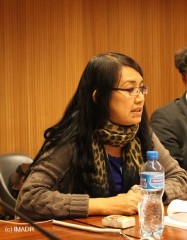 came to her attention when she was 18 years old. Lack of rule of law was pointed out as a main challenge to address sexual violence, which has contributed to the continuing sexual violence by army personnel. She also reminded participants that not only in armed conflict areas, but also civil administration officers are committing sexual violence against local poor women in non-conflict areas. Women, whose lands have been grabbed, are threatened by the authority to be raped if they speak up against oppression.
came to her attention when she was 18 years old. Lack of rule of law was pointed out as a main challenge to address sexual violence, which has contributed to the continuing sexual violence by army personnel. She also reminded participants that not only in armed conflict areas, but also civil administration officers are committing sexual violence against local poor women in non-conflict areas. Women, whose lands have been grabbed, are threatened by the authority to be raped if they speak up against oppression.
Dr. Fernando spoke of fear of victims to come out with evidence, since there is no official and community protection for women to make complaint on sexual violence. Human rights defenders also face challenges in exposing cases of sexual violence since women will face stigmatisation in their communities. She also pointed out the lack of attentions given to address sexual violence against former LTTE combatants who continue to face threats from the military and surveilance units in the North. Since the Government of Sri Lanka has not dealt with the issues of sexual violence, she claimed that the UN has the responsibility to address the issues as well as to raise concerns related to the issue of security and protection for these women and women human rights defenders (WHRDs).
Scrutiny by the Human rights Council
Dr. Pollard posed questions with regard to the Human Rights Council’s specific attentions to the countries such as the Special Rapporteur and the OHCHR Investigation. He asked their views on domestic impacts by those measures, need for continuing attention as well as their hopes.
Ms. Ohmar reminded the audience that there are more violent incidents now compared to the year 2013. Although she wishes that one day Burma will no longer need the Council’s attention under the item 4, the time has not come yet. Since 1992, various human rights issues including forced labour and the use of child soldiers have been committed mainly by the Burmese army. Perpetrators have not been held accountable and a number of ministerial positions such as the Minister of Foreign Affairs, Defence, Interior, and Security are still held by army personnel directly nominated by the Commander in Chief. Therefore, Burma needs to remain under the item 4 more than ever.
Dr. Fernando remembered that it was dramatically challenging to come to Geneva and speak about human rights violations in 2012. With the new government, HRDs are experiencing a sense of relief. She recognises some improvements at the local level, yet the country still lacks the capacity to address long-standing human rights issues in a systematic manner without any independent judicial and human rights bodies. She also recalled that main perpetrators of grave human rights violations are still in power and influential the country.
Political changes and risks of civil society
Dr. Pollard then moved to the question on political changes in the countries and risks faced by civil society. It includes responses from the international community.
Ms. Ohmar remembered high hopes and optimism in the past 3 years which also erupted when Aung San Suu Kyi was released. However, civil society started seeing the army detaining all resources and the opposition is given a little space in the Parliament. The government is attempting to arbitrary select their “registered NGOs”, but civil society is contesting such registration to operate freely. She also expressed her frustration for the lack of consultation by the government with civil society, in which resulted in adoption of various laws affecting civil society activities. Ms. Ohmar emphasised that Burma has to be kept under the item 4 of the Council, since the government has not fulfilled its human rights responsibility.
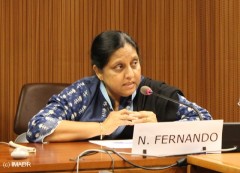 Dr. Fernando expressed her hope for the adoption of the 19th amendment to the Constitution, which abolishes executive presidency and restores the independence of commissions. Dr. Fernando also insisted that Sri Lanka has to remain in the agenda of the Council, since the country has a long way to go.
Dr. Fernando expressed her hope for the adoption of the 19th amendment to the Constitution, which abolishes executive presidency and restores the independence of commissions. Dr. Fernando also insisted that Sri Lanka has to remain in the agenda of the Council, since the country has a long way to go.
The panellists had interactive discussions with the audience. Questions from the audience included balancing between free speech and hate speech and impunity for sexual violence. The panellists shared their concerns on the misuse of the anti-terrorism acts against human rights defenders, and the need to take appropriate measures against hate speech. Both the panellists echoed on the lack of rule of law as a main cause for impunity for sexual violence.


